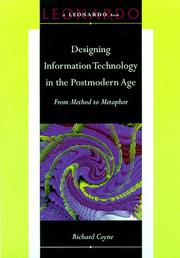| Listing 1 - 2 of 2 |
Sort by
|
Book
ISBN: 0124159281 0124159028 1299963005 9781299963009 9780124159280 9780124159020 Year: 2013 Publisher: Waltham, MA : Academic Press,
Abstract | Keywords | Export | Availability | Bookmark
 Loading...
Loading...Choose an application
- Reference Manager
- EndNote
- RefWorks (Direct export to RefWorks)
Exterior analysis uses differential forms (a mathematical technique) to analyze curves, surfaces, and structures. Exterior Analysis is a first-of-its-kind resource that uses applications of differential forms, offering a mathematical approach to solve problems in defining a precise measurement to ensure structural integrity. The book provides methods to study different types of equations and offers detailed explanations of fundamental theories and techniques to obtain concrete solutions to determine symmetry. It is a useful tool for structural, mechanical and electrical engine
Differential forms --- Exterior forms --- Mathematics --- Physical Sciences & Mathematics --- Calculus --- Geometry --- Manifolds (Mathematics) --- Calculus of variations. --- Differential equations, Partial --- Exterior forms. --- Numerical solutions. --- Forms, Exterior --- Isoperimetrical problems --- Variations, Calculus of --- Geometry, Differential --- Numerical analysis --- Maxima and minima --- Topology --- 168.53 --- 168.53 Technische wetenschappen. Toegepaste wetenschappen --- Technische wetenschappen. Toegepaste wetenschappen --- Calculus of variations --- Numerical solutions --- Differential forms. --- Engineering mathematics.

ISBN: 0262032287 0262518945 0262270889 058502555X 9780585025551 9780262270885 9780262518949 9780262032285 Year: 1995 Publisher: Cambridge, Mass. MIT Press
Abstract | Keywords | Export | Availability | Bookmark
 Loading...
Loading...Choose an application
- Reference Manager
- EndNote
- RefWorks (Direct export to RefWorks)
Designing Information Technology in the Postmodern Age puts the theoretical discussion of computer systems and information technology on a new footing. Shifting the discourse from its usual rationalistic framework, Richard Coyne shows how the conception, development, and application of computer systems is challenged and enhanced by postmodern philosophical thought. He places particular emphasis on the theory of metaphor, showing how it has more to offer than notions of method and models appropriated from science. Coyne examines the entire range of contemporary philosophical thinking - including logical positivism, analytic philosophy, pragmatism, phenomenology, critical theory, hermeneutics, and deconstruction - comparing them and showing how they differ in their consequences for design and development issues in electronic communications, computer representation, virtual reality, artificial intelligence, and multimedia. He also probes the claims made of information technology, including its presumptions of control, its so-called radicality, even its ability to make virtual worlds, and shows that many of these claims are poorly founded. Among the writings Coyne visits are works by Heidegger, Adorno, Benjamin, Gadamer, Derrida, Habermas, Rorty, and Foucault. He relates their views to information technology designers and critics such as Herbert Simon, Alan Kay, Terry Winograd, Hubert Dreyfus, and Joseph Weizenbaum. In particular, Coyne draws extensively from the writing of Martin Heidegger, who has presented one of the most radical critiques of technology to date.
165.76 --- 168.53 --- Information technology --- System design --- 681.3 --- Design, System --- Systems design --- Electronic data processing --- System analysis --- IT (Information technology) --- Technology --- Telematics --- Information superhighway --- Knowledge management --- 168.53 Technische wetenschappen. Toegepaste wetenschappen --- Technische wetenschappen. Toegepaste wetenschappen --- 165.76 Postmodernisme. Poststructuralisme. Post-modernisme. Post-structuralisme --- Postmodernisme. Poststructuralisme. Post-modernisme. Post-structuralisme --- Computerwetenschap --- 681.3* / / / / / / / / / / / / / / / / / / / / / / / / / / / / --- Information technology. --- System design. --- Technologie de l'information --- Systèmes, Conception de --- Electrical & Computer Engineering --- Engineering & Applied Sciences --- Information Technology --- COMPUTER SCIENCE/Human Computer Interaction --- CULTURAL STUDIES/Critical Theory --- Technology. --- Applied science --- Arts, Useful --- Science, Applied --- Useful arts --- Science --- Industrial arts --- Material culture
| Listing 1 - 2 of 2 |
Sort by
|

 Search
Search Feedback
Feedback About UniCat
About UniCat  Help
Help News
News